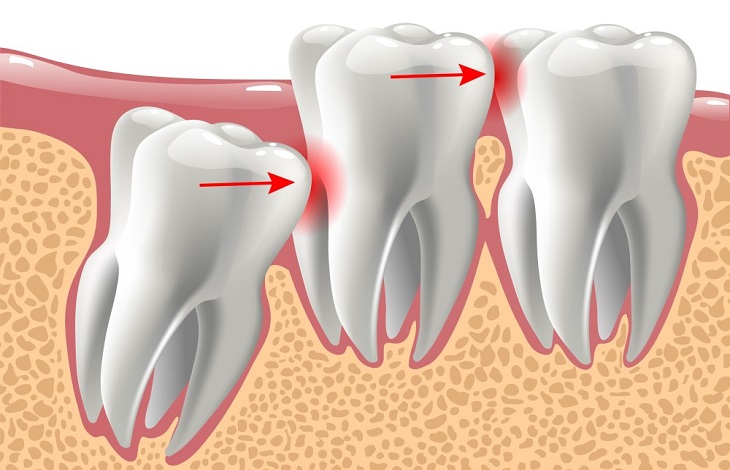Can You Get Wisdom Teeth In Your 30’s?
Dental practitioners deal with issues regarding wisdom teeth regularly. Patients often have wisdom teeth that need removing. But, if wisdom teeth are so troublesome, why do we get them?
Keep reading as we discuss the wisdom tooth phenomenon – including when to expect your wisdom teeth to come in, why we have wisdom teeth and the wisdom teeth removal process.
What Are Wisdom Teeth?
Wisdom teeth are molars, your most robust type of tooth. They are designed to help grind down tough pieces of food to make it easy to swallow. Some people develop wisdom teeth, while others do not. Wisdom teeth are the most commonly absent teeth in the adult mouth, probably because we have evolved as a species over the years and may not have the exact requirements we once needed to survive.
Wisdom teeth come in later than our other adult teeth, and it can be pretty painful when they emerge. In addition, not all wisdom teeth grow straight or in the correct position. A condition when wisdom teeth grow into the other teeth is called impaction. Due to the commonality of impaction, wisdom teeth removal is a standard procedure. One of the main reasons impaction occurs is because the wisdom tooth does not have enough gum room to grow through, causing it to grow in another direction.
Some other issues you might encounter with your wisdom teeth include:
- Infections and cavities caused by plaque buildup.
- Lesions.
- The tooth may impact your ability to brush and floss other teeth properly.
- The wisdom tooth might cause bone loss at the roots and damage your other teeth.
- When the wisdom tooth grows, it is surrounded by a sack of tissue. This tissue could form a cyst which may damage your jaw.
- If the tooth grows inside the gum, this could be detrimental to the roots of your other teeth.
- If the tooth only emerges partly, this could encourage the growth of plaque and bacteria.
If you are experiencing pain when your wisdom teeth come in, it’s a good idea to seek the advice of a dentist. They will be able to perform a dental X-ray that will provide more insight into how your wisdom teeth are growing. They will likely recommend a wisdom tooth extraction procedure if they detect an issue with your teeth in a regular checkup.
Can You Get Wisdom Teeth When You Are In Your 30’s?
Wisdom teeth usually emerge between the ages of 17 and 25. The name ‘wisdom teeth’ was given to these molars because they come in while a person is at a mature age. It is incredibly uncommon for adults to get wisdom teeth past 30. However, many people have their wisdom teeth emerge in their late 20s and up until their 30s.
If you are in your 30s and still haven’t had your wisdom teeth, you shouldn’t worry. Many people do not develop wisdom teeth, which can cause complex issues when they emerge. If you have healthy wisdom teeth in your 30s and have experienced no problems, then it is likely that you won’t have any further issues with them.
Do We Need Wisdom Teeth?
When humans first evolved, we did not have knives, forks, and other utensils to break food down into bitesise pieces. Instead, we had to chew meats and other foods to break them into digestible chunks. For this, we required a large jaw and plenty of chewing power – hence, we had wisdom teeth. Since there was no toothpaste in these early times, humans likely suffered tooth loss regularly. By having extra teeth grow later in life, we could retain our chewing power for as long as possible.
Are There Side Effects Of Wisdom Teeth Removal?
When your wisdom teeth are removed, you can expect to feel some pain after the procedure. In addition, there will likely be some residual bleeding on the first day of your recovery. In the next few days following the process, you can expect some bruising and swelling. You should refrain from brushing your teeth or using mouthwash after the procedure, as this could aggravate your surgical wound. Instead, it’s recommended that you rinse your mouth with salt water at least once every 24 hours after the process.
Once you have had your procedure, you should ask a friend or family member for a ride home. You may still be tired or dizzy from the anaesthetic, and you may not be able to drive. Use an ice pack to reduce any swelling or inflammation in the area, avoid alcohol, and drink plenty of water after the procedure.
Summary
Wisdom teeth can come anytime between the ages of 17 and 25 and even well into your late 20s. You should+n’t expect to see your wisdom teeth come past the age of 30, as this is highly uncommon. Some people experience issues with their wisdom teeth when they come in and need an extraction. Speak to your local Maroubra Dentist if you think your wisdom teeth are coming through to get them checked out.
Read Also:
What To Do If Your Child Has A Painful, Wobbly Tooth
Hereditary Dental Disorders And Conditions To Watch For
Dental Tips For Teens
